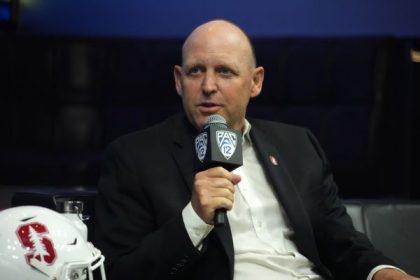CLEARWATER, Fla. — In February 1997, a 34-year-old third base coach for the Yankees’ Triple-A affiliate was given a daunting responsibility: run minor-league spring training.
Rob Thomson’s task had previously belonged to Mark Newman, who had served as the team’s minor-league field coordinator for seven seasons. But Newman had been promoted to vice president of player development and scouting the season prior and the club hadn’t yet backfilled his old position. That meant someone needed to take charge of New York’s minor-league camp while Newman handled things on the big-league side.
And so, he turned to the ever-reliable Thomson.
But in order to scheme out all the different drills, rotations and player groups, Thomson had to teach himself a new computer program, one that had been completely foreign to the ballcoach: Microsoft Word.
ADVERTISEMENT
“I had never used a computer,” Thomson told FOX Sports. “The first time I ever used one was during that spring training in ‘97.”
Eventually, he adapted to the newfangled tech and proceeded to command what he remembers as a crisp and productive camp. Thomson did well enough that after the 1997 season, Newman offered him the field coordinator gig for 1998, a job that involved organizing spring training for the minors and majors.
While Thomson couldn’t have known it at the time, his ability to coordinate a well-run camp would become a defining characteristic of his coaching life. From that spring in 1997 until last year, Thomson conducted 25 consecutive spring trainings, the first 20 for the Yankees in Tampa, the last five for the Phillies in Clearwater. Ask any coach who spent time working with or for Philadelphia’s manager, and they’ll mention how well he runs spring training and how much he loves doing it.
But the 59-year old Thomson, who had intended for 2022 to be his final season as the Phillies bench coach before retiring, has a new job these days. When former skipper Joe Girardi was given the heave-ho last year in early June, the man now known eternally as “Philly Rob” was given the reins. And after shepherding the Phillies through a season for the ages, Thomson is experiencing spring training as a big-league manager for the very first time.
That means a different set of responsibilities: daily meetings with media, a more hands-on approach with the big-league club, being in the dugout during spring training games, etc. And so for the first time since he learned how to operate Microsoft Word, Thomson is no longer responsible for the day-to-day minutiae that had become the rhythm of his Februaries. That job has fallen onto the shoulders of bench coach Mike Calitri, the man who took over the bench coach role once Thomson got promoted.
And Calitri, well, he uses Excel.
“[Calitri] and I have been working together since we came to the Phillies, so he knows exactly what to do.” Thomson explained, like a seasoned wedding planner finally turning over the reins of the business to a beloved protege. “Our first few days have been spot on.”
Running spring training is a hectic, thankless job. It requires an immense amount of organization, constant communication with the entire coaching staff and many, many extremely early mornings.
Calitri estimates that so far this spring he’s woken up around 4:30 a.m. most days and usually hits the pillow around 8:45 p.m. It’s an exhausting lifestyle, one that has taken a toll on Calitri’s now-hoarse voice just a few days into camp, but it’s a process that he’s intent on doing the right way.
And with the king of spring down the hall, Calitri’s first camp at the helm has been seamless.
“It’s been helpful having him as a resource.” Calitri said. “But he had so many different versions of the schedule and so much of it lives up there in his head.”
For fans who take in camp via short clips on social media of their favorite players stretching or playing catch, spring training might not seem all that complicated. But the whole operation can be a bit like conducting an orchestra or organizing a well-attended business convention, except it’s outside under the Florida sun and nobody is playing the trumpet.
Whether it’s making sure that Rookie X is in the same BP group as Veteran Y or that a certain catcher is available for a particular pitcher’s bullpen session or that the infielders and outfielders finish their individual drills simultaneously before a full-team session, there are a million things for Calitri or any other coordinator to keep track of.
Overseeing a well-oiled spring training is like conducting an orchestra or organizing a well-attended business convention, except it’s outside in the Florida sun and there aren’t any trumpets. But at the end of the day, it’s all about avoiding injury while ensuring that the big dogs are getting prepared for the season and the younger players are getting the opportunity to develop.
In Thomson’s opinion, those goals are accomplished by making sure that players are (1) never confused about where to be and (2) are never standing around, doing nothing.
“I used to think about it like I was in a helicopter,” he said. “I’m watching players move around, making sure that they’re always moving in a circle, not crisscrossing. If you get ‘em runnin’ around, you’ll lose ’em.”
But that’s not Thomson’s direct concern anymore — after 25 years he’s earned the right to take his hands off the wheel a little bit and let someone else steer the ship. Chances are he won’t even have to boot up Microsoft Word all spring.
Jake Mintz, the louder half of @CespedesBBQ is a baseball writer for FOX Sports. He’s an Orioles fan living in New York City, and thus, he leads a lonely existence most Octobers. If he’s not watching baseball, he’s almost certainly riding his bike. Follow him on Twitter at @Jake_Mintz.
More Baseball from FOX Sports:
Top stories from FOX Sports:

Get more from Major League Baseball Follow your favorites to get information about games, news and more












